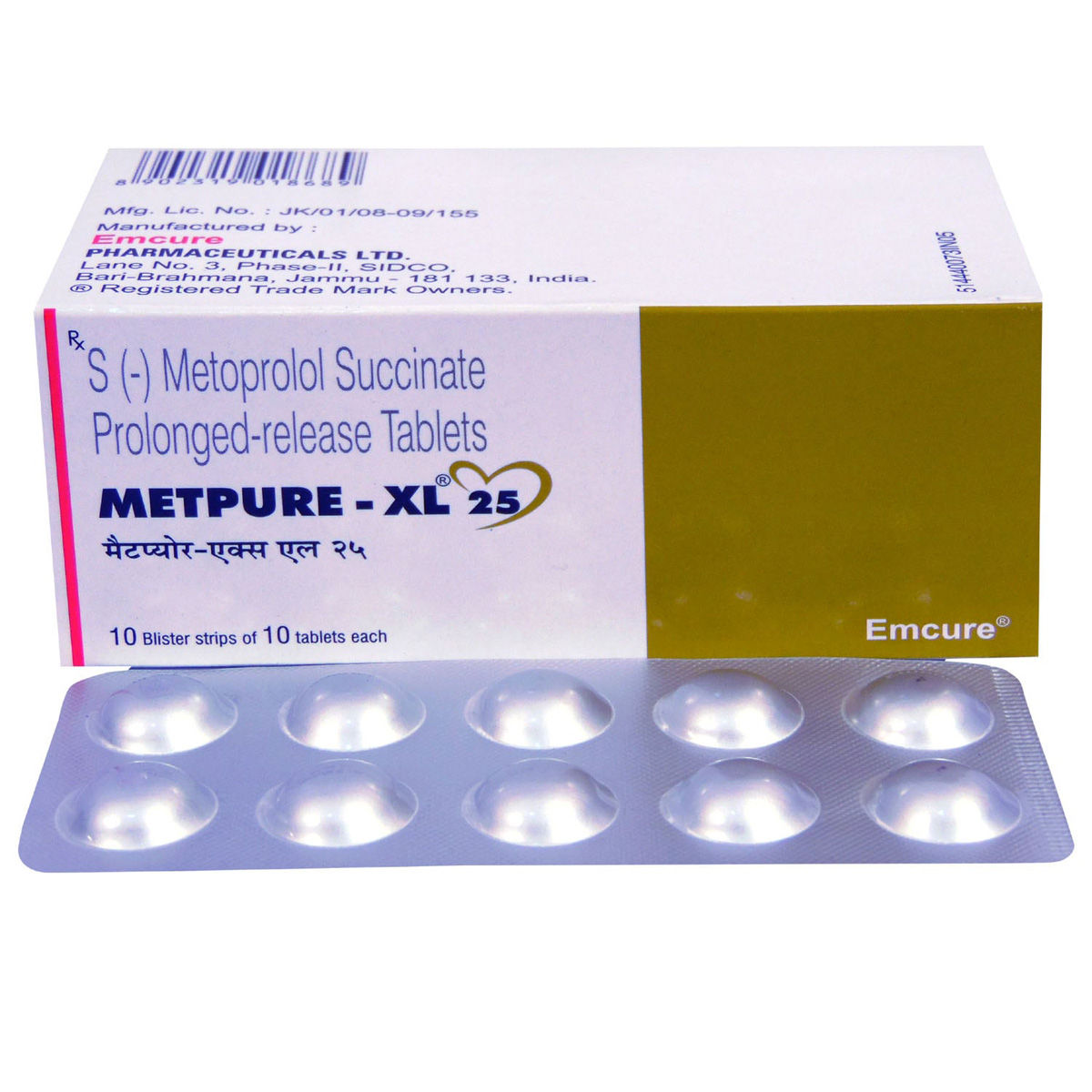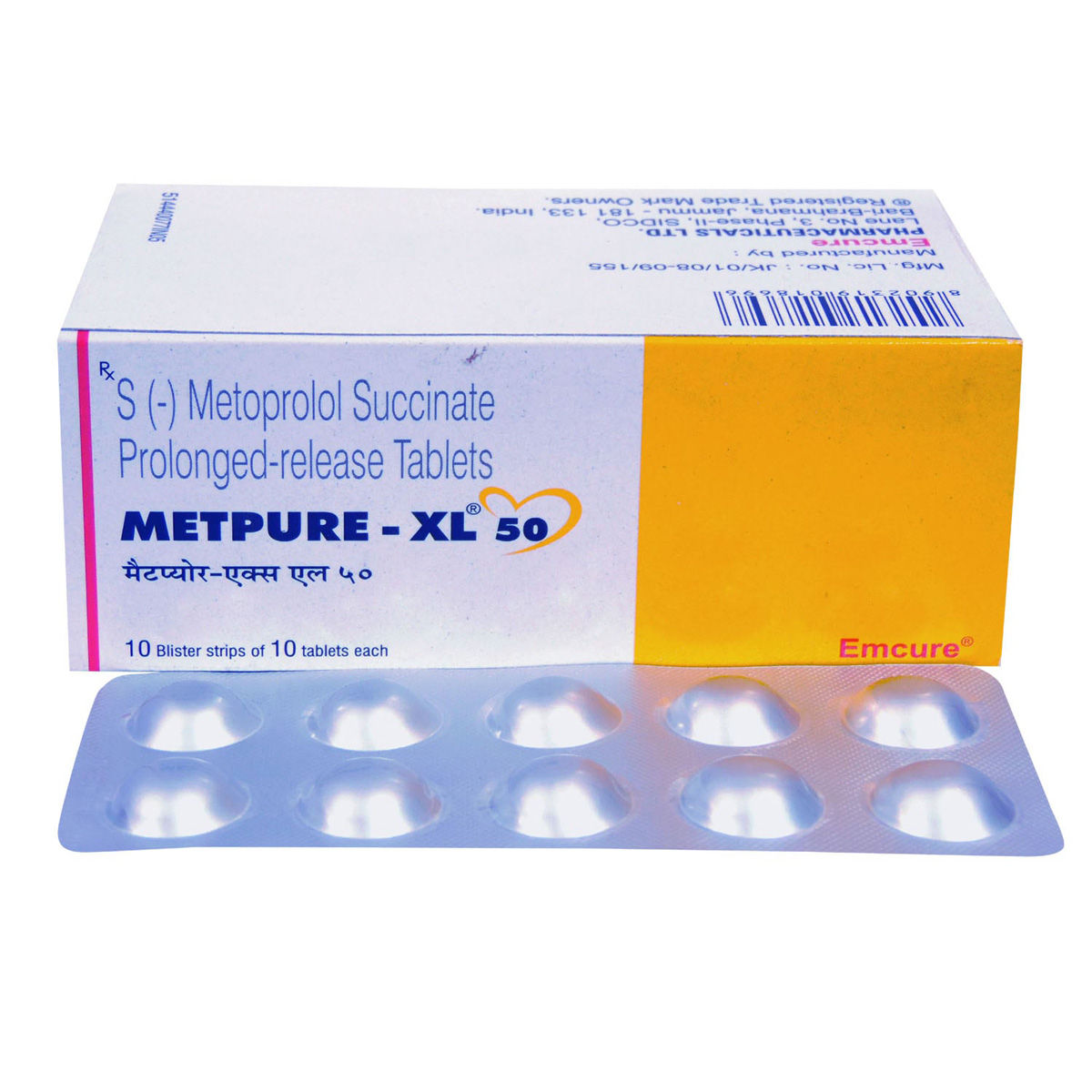S Metoprolol
About S Metoprolol
S Metoprolol belongs to a group of medicines called “Antihypertensive” used alone or together with other medicines to treat high blood pressure (hypertension), heart-related chest pain (angina), heart rhythm disorder (arrhythmia). Besides this, it also helps in relieving symptoms of migraine-related headaches. High blood pressure adds to the workload of the heart and arteries. Hypertension or high blood pressure is a long-term force of the blood against the arteries that may lead to various types of heart diseases. If it continues for a long time, it can damage the blood vessels (arteries) of the brain, heart, and kidneys, resulting in a stroke, heart failure, or kidney failure. Lowering blood pressure reduces the risk of stroke, heart attack, and heart-related chest pain (angina).
S Metoprolol plays a vital role in relaxing our blood vessels by blocking the action of certain natural substances in your body. It helps in slowing down the heart rate making it easier for pumping more blood around your body. This lowers your blood pressure and helps in reducing your risk of having a stroke, a heart attack, other heart problems, or kidney problems in the future. S Metoprolol needs to be taken regularly to be effective.
S Metoprolol should be taken in the dose and duration as advised by your doctor. You are advised to take S Metoprolol for as long as your doctor has prescribed it for you depending on your medical condition. In some cases, you may experience certain common side effects such as headache, fatigue, nausea, and vomiting, stomach upset, diarrhoea or constipation, abdominal pain, numbness, cold extremities. Most of these side effects of S Metoprolol do not require medical attention and gradually resolve over time. However, if the side effects are persistent, reach out to your doctor. However, you are advised to talk to your doctor if you experience these side effects persistently.
Don't stop taking S Metoprolol without talking to your doctor first. Stopping S Metoprolol abruptly may cause changes in your heart rhythm and blood pressure, cause chest pain, or a heart attack. Your doctor will lower your dose gradually over a period of time to help prevent these symptoms. S Metoprolol should not be used to prevent heart attacks. You should not use S Metoprolol if you have a very slow heartbeat, asthma, serious heart condition (sick sinus syndrome), or any heart blockage. Pregnant women and breastfeeding women should consult their doctor before taking S Metoprolol. Driving and operating heavy machinery should not be done as it may cause dizziness and drowsiness. Orthostatic hypotension (sudden lowering of blood pressure n standing) might occur so patients using S Metoprolol should get up with caution. S Metoprolol is contraindicated if you have high amounts of potassium in your blood (shown in blood test results). S Metoprolol may affect your ability to drive or operate heavy machinery if taken with alcohol.
Uses of S Metoprolol
Medicinal Benefits
S Metoprolol contain S-Metoprolol that works by blocking both beta receptors namely beta 1 and beta 2. S Metoprolol blocks beta 1 receptor located in the cells of the heart that lowers heart rate and decreases heart's blood pumping frequency decreasing raised blood pressure. On the other hand, S Metoprolol also blocks beta 2 receptors located in the lungs (bronchioles) and blood vessels of skeletal muscle narrowing it. This in turn lowers your overall body's blood pressure and helps in reducing the risk of having a stroke, heart problems, or kidney problems in the future. S Metoprolol also improves the symptoms of heart-related chest pain (angina) and may increase a person's stamina to do exercise with angina. It also blocks the effects of epinephrine, which causes the heart to beat slower. Additionally, S Metoprolol reduces symptoms of essential tremor (fits), and prevent migraine. S Metoprolol can reduce symptoms of too much thyroid hormone (thyrotoxicosis) and can be taken together with thyroid-related medicines to treat an overactive thyroid. S Metoprolol is an extended-release medication, its active ingredient is released slowly over time into the body, so you will need to take the medication once a day.
Directions for Use
Storage
Side Effects of S Metoprolol
- Headache
- Fatigue
- Nausea
- Vomiting
- Stomach upset
- Diarrhoea
- Constipation
- Abdominal pain
Patients Concern
Disease/Condition Glossary
Hypertension: High blood pressure is a chronic condition when the blood pressure and the heart's workload is too high. This condition can lead to hardened arteries (blood vessels), decreasing the blood and oxygen flow to the heart. Raised blood pressure can cause chest pain (angina) and heart attack (when blood supply to the heart is blocked). Additionally, high blood pressure also causes brain damage (stroke) and kidney failure. High blood pressure can be diagnosed with the help of a blood pressure monitor or sphygmomanometer. Systolic pressure is the pressure when the heart pumps blood out. On the other hand, diastolic pressure is when your heart is at the resting stage between heartbeats. If your blood pressure is 140/90 mm of Hg, it means the systolic pressure is 140 mm of Hg and, diastolic pressure is 90 mm of Hg. Ideal blood pressure should be between 90/60 mm of Hg and 120/80 mm of Hg.
FAQs
S Metoprolol contains 'S-metoprolol' that helps to reduce the blood pressure by allowing the blood to flow more smoothly. It is an extended-release medication, its active ingredient is released slowly over time into the body, so you will typically only need to take the S Metoprolol once a day.
Use of S Metoprolol in diabetes may mask tachycardia (fast heart rate) occurring with low blood sugar level, but other symptoms like dizziness and sweating may not be significantly affected. So, if you are diabetic patients always consult a doctor before taking S Metoprolol.
Serum sodium, serum potassium, white blood cells, kidney or renal function should be closely monitored before taking S Metoprolol.
Your doctor may probably tell you to stop taking S Metoprolol as it lowers blood pressure (hypotension) when combined with general anaesthesia before surgery. So, please inform your doctor before surgery if you are taking S Metoprolol.
It is advised to continue your medicine even after your blood pressure is under control or becomes normal as blood pressure can shot up at any time. If you have any discomfort, please consult your doctor immediately.
S Metoprolol can increase blood potassium level, So, potassium-rich diet and supplements should be avoided while taking S Metoprolol to avoid any unpleasant side effects.









